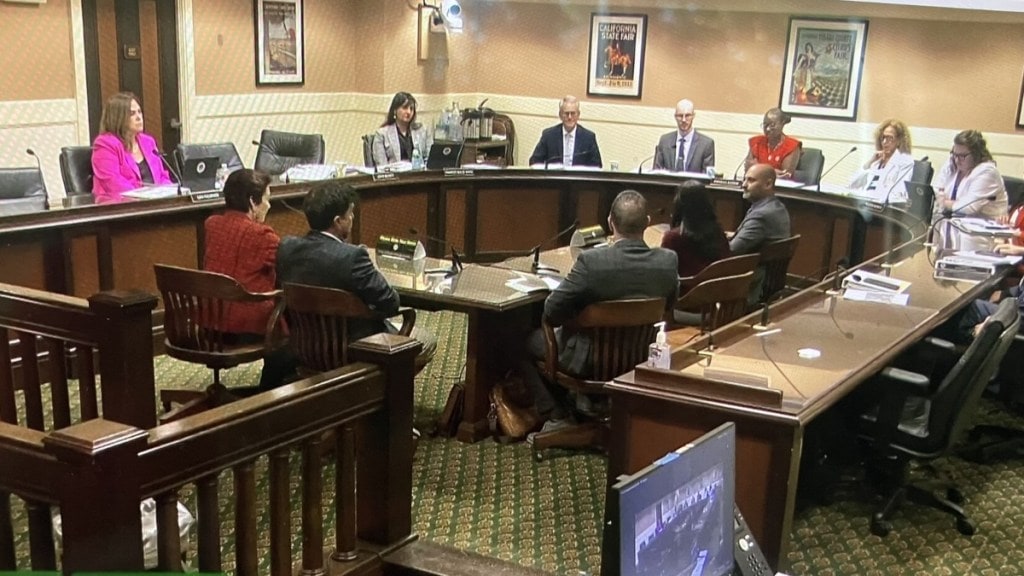Both houses of California’s state legislature have passed the controversial Senate Bill 509 (SB509). The bill, introduced by Senator Anna Caballero (D-Merced), says police officers must get training on “transnational repression,” which means harassment or threats by foreign governments against people living in the US. Critics say this law could unfairly focus on India and Indian-American communities.
Several groups, including the Hindu American Foundation (HAF), the Coalition of Hindus of North America (CoHNA) and HinduPACT, are strongly against the bill. They say it could unfairly focus on Indian-American and Hindu communities while claiming to prevent foreign interference. HAF also point out that it could be used to silence opposition to the separatist Khalistan movement, which has been linked to extremist and terror activities.
“Proponents of this bill and previous failed versions sought to silence advocacy against the separatist Khalistan movement, deeply tied to transnational terror attacks,” HAF said in a post on X (formerly Twitter). The foundation added that while HAF and other advocacy groups succeeded in making important amendments to prevent the bill from curbing criticism of Khalistani extremism, it still remains problematic.
BREAKING | Both houses of California’s state legislature just passed the highly controversial, heavily amended SB509, that would target India and Indian Americans in mandated training about “transnational repression.”
Proponents of this bill and previous failed versions sought… pic.twitter.com/E7s32MiM6k
— Hindu American Foundation (@HinduAmerican) September 12, 2025
Supporters say this training will help protect vulnerable groups and help police recognise foreign interference. “All Californians deserve to feel safe in their homes, workplaces and neighbourhoods,” Caballero said.
HAF, however, says the bill is “expensive” and “ redundant” and does not really protect Californians. Instead, it could let activists train police to ignore Khalistani extremism and monitor Indian and Hindu Americans who are simply exercising their First Amendment rights.
“HAF will be requesting @CAgovernor to veto this expensive, redundant bill that does nothing to protect Californians but will enable activists to train law enforcement to ignore homegrown Khalistan extremism,” HAF added.
On July 14, Hindus from across California made their way to Sacramento and the State Capitol building to make their views heard at the Assembly Emergency Services Committee Hearing for SB509 (Transnational Repression; Training Services bill). This is advocacy and democracy in… pic.twitter.com/J1YYMjKkFx
— CoHNA (Coalition of Hindus of North America) (@CoHNAOfficial) July 15, 2025
Australia today quoted Samir Kalra, managing director of HAF and civil rights attorney as saying, “The bill lacks the guardrails necessary to prevent trainings on transnational repression from being politicised.”
Previous efforts to amend the bill to safeguard civil liberties were rejected. This has raised fears that peaceful advocacy and cultural activities might be mislabelled as transnational repression. CoHNA board member Sudha Jagannathan also expressed concern.
Governor’s decision pending
Supporters of SB 509 – including law enforcement leaders and immigrant rights advocates – insist the bill is vital to make sure communities targeted by foreign governments receive proper protection.
The Governor is expected to decide in the coming weeks whether to sign the bill into law or veto it.
Attacks on temples fuel tensions
The debate comes at a time when Hindu temples in California have faced a wave of attacks, allegedly by Khalistani extremists. Critics say SB 509 focuses too much on foreign threats while failing to address urgent risks posed by domestic extremists, such as white supremacists and Khalistani groups.
A Hindu temple of the Bochasanwasi Shri Akshar Purushottam Swaminarayan Sanstha (BAPS) in Greenwood, Indiana, was vandalised in September, allegedly by pro-Khalistan separatists, the Hindu American Foundation (HAF) said. The temple walls were painted with anti-India and anti-Prime Minister Narendra Modi graffiti. This is the fourth attack on a Hindu temple in the US this year.
The Greenwood incident adds to a growing number of such attacks on Hindu places of worship across the US in the past year. In March 2024, a well-known temple in Southern California was also defaced with anti-Hindu and anti-India graffiti. India’s Ministry of External Affairs strongly condemned the act, calling it “despicable,” and urged US authorities to take strict action while ensuring proper security for temples and other places of worship.

